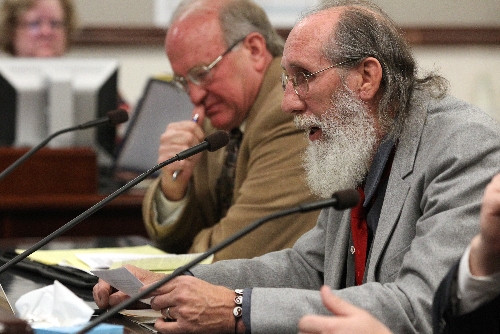Bid to change eminent domain law gains traction

Nevada’s 130-year-old legal provision giving mining companies the right of eminent domain might be about to get buried because of an unlikely coalition of liberal and conservative forces.
Environmental activists and Tea Party Republicans have joined forces in criticizing the provision, which dates back to Nevada’s Comstock era when mining companies ruled the state’s economy and its politics.
And a bill by Sen. Sheila Leslie, D-Reno, to strip the provision from law is tapping bipartisan resentment of the industry’s power.
"This might be the impetus to take it over the top," said historian Guy Rocha who has supported previous, failed efforts to strike the provision. "Before, at best, it may have ended up in another compromise."
Left-leaning environmental and community activists have targeted the provision for decades but were always out-muscled by the politically entrenched mining industry, which employs more lobbyists than there are members of the state Senate.
A bill in 1981 included restrictions on eminent domain in historic areas, but the main provisions favoring mining remained in place.
Leslie was unaware of the issue until summer when she read about a case in Elko in which a mining company was seeking to use the power to acquire ranch property. She pre-filed a bill Jan. 7, but the ground really shifted under the miners’ feet Monday during testimony on Leslie’s Senate Bill 86 that included Comstock residents who fear mining companies will use the threat of eminent domain to push them off their property.
"We do not live in the 19th century when mining was for all practical purposes the only economic activity in this state," said Silver City resident Larrry Wahrenbrock. "This bill affirms my private property rights as equal to any mining company."
After the testimony freshman Sen. Michael Roberson, R-Las Vegas, said he supported Leslie’s ideas and other Republicans followed.
Freshman lawmaker, Sen. Elizabeth Halseth, R-Las Vegas, criticized the mining industry in a blog post Tuesday and said Leslie’s proposal was a good bill.
By Wednesday Senate Assistant Minority Leader Barbara Cegavske, R-Las Vegas, said she planned to sign on to Leslie’s bill.
Republicans cited a desire to protect private property rights as a reason for supporting Leslie, one of the Legislature’s most liberal members.
Snowballing support for the bill put mining industry lobbyists on the defensive.
James Wadhams, a lobbyist for Newmont Mines, shifted from a defensive tone to a willingness to compromise as more Republicans got behind Leslie.
Wadhams, who had been quoted referring to Leslie supporters as "eco-terrorists," a remark for which he apologized, acknowledged times have changed since the provision was written into law in 1875 as a "paramount interest" in the state.
Today mining employs about 12,000 people in a state labor force of about 1.3 million and "is a small activity, hardly paramount," Wadhams said.
Nevada Mining Association President Tim Crowley said his group will continue to press for changes to soften the bill.
Crowley said limits on mining could inhibit the development of geothermal energy and the mining of lithium, two activities that are important to increasing the availability of renewable energy.
"Utilizing eminent domain can be in the public’s best interest," Crowley said.
Although it appears Leslie has enough support to get the bill through the Senate, potential obstacles remain.
Sen. Dean Rhoads, R-Tuscarora, said Wednesday he supports keeping the law as it is, with mining companies maintaining the eminent domain privilege.
Republican Gov. Brian Sandoval was noncommittal on the issue during a recent meeting with Leslie.
"I told (Sandoval) it was probably going to land on his desk sooner rather than later," she said.












